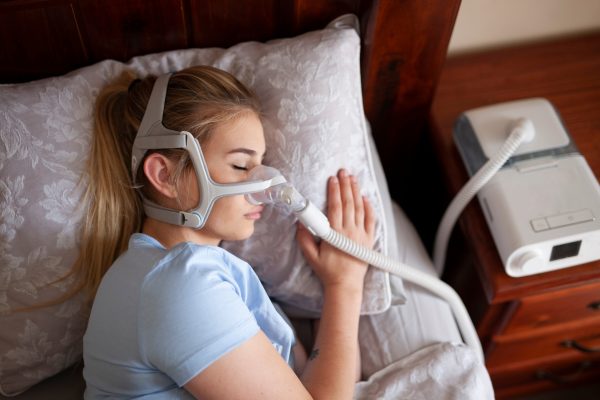Your Sleep Apnea Diagnosis
The first step in treating your sleep disorder is to ensure a proper diagnosis. Taking a sleep study is the only way to determine if you have a sleep disorder, such as sleep apnea. Sleep studies are designed to evaluate your sleep quality and measure specific factors, like snoring, breathing levels, and body movements. This test is typically conducted at a sleep clinic but Dr. Slodobdinksy also offers take-home sleep studies for your convenience.
Once you’ve received a proper sleep apnea diagnosis, Dr. Slobodinksy will review your test results and find a treatment that fits your needs and preferences.
The Problem With CPAP
CPAP (continuous positive airway pressure) machines deliver air through a hose and a mask into the airway to prevent it from collapsing. While it’s been the standard sleep apnea treatment for many years, the forced air and its bulky size are the cause of many complaints.
Patients report being dissatisfied with the device for various reasons, including:
- Noisy
- Inconvenient when traveling
- Uncomfortable
- Dry or stuffy nose
- Feeling claustrophobic
- Skin irritation or pressure sores
- Difficulty sleeping
- Dry mouth
The downsides of CPAP treatment cause patients to stop using it altogether. Fortunately, Dr. Slobodinky offers CPAP alternatives to ensure that patients get the treatment they need for their sleep apnea.
Find Relief With Oral Appliances
Many of our patients find relief from their snoring and sleep apnea using our customized oral appliances. Here at Sleep Well Philadephia, we can treat your sleep apnea with the help of the Zyppah® Professional device. This oral appliance works by gently shifting your jaw forward to help prevent your airway from collapsing.
This noiseless device resembles a retainer and it doesn’t contain any wires or tubes that can disrupt your sleep. We believe that the Zyppah® Professional device is the most effective and comfortable appliance for treating sleep apnea and snoring. Now you can get the treatment you need without the hassles that accompany CPAP.
Additional CPAP Alternatives
In addition to the use of your oral appliance, Dr. Slobodinksy may recommend certain lifestyle changes so we can address underlying issues and you can get the most out of your treatment. Natural remedies to help relieve snoring and sleep apnea include:
- Regular exercise & a well-balanced diet: Diets such as the Mediterranean diet can be an effective way to lose weight and reduce excess tissue blocking the airway.
- Positional therapy: Avoiding sleeping on your back can help reduce your sleep apnea symptoms. It’s used to improve breathing patterns and reduce snoring.
- Throat & mouth exercises: These can help relieve your symptoms of sleep apnea. It works by strengthening the muscles along the airway.
- Limit alcohol consumption & avoid tobacco: This will help decrease the severity of your symptoms.
Once you’ve been properly diagnosed, Dr. Slobodinksy will help create a personalized treatment plan tailored to your individual needs. This will include remedies and lifestyle changes that would work best for your unique situation in combination with an oral appliance.
In the most severe cases, surgery may be recommended after conservative treatments have proved to be unsuccessful. However, the surgery is invasive and only used as a last resort.


